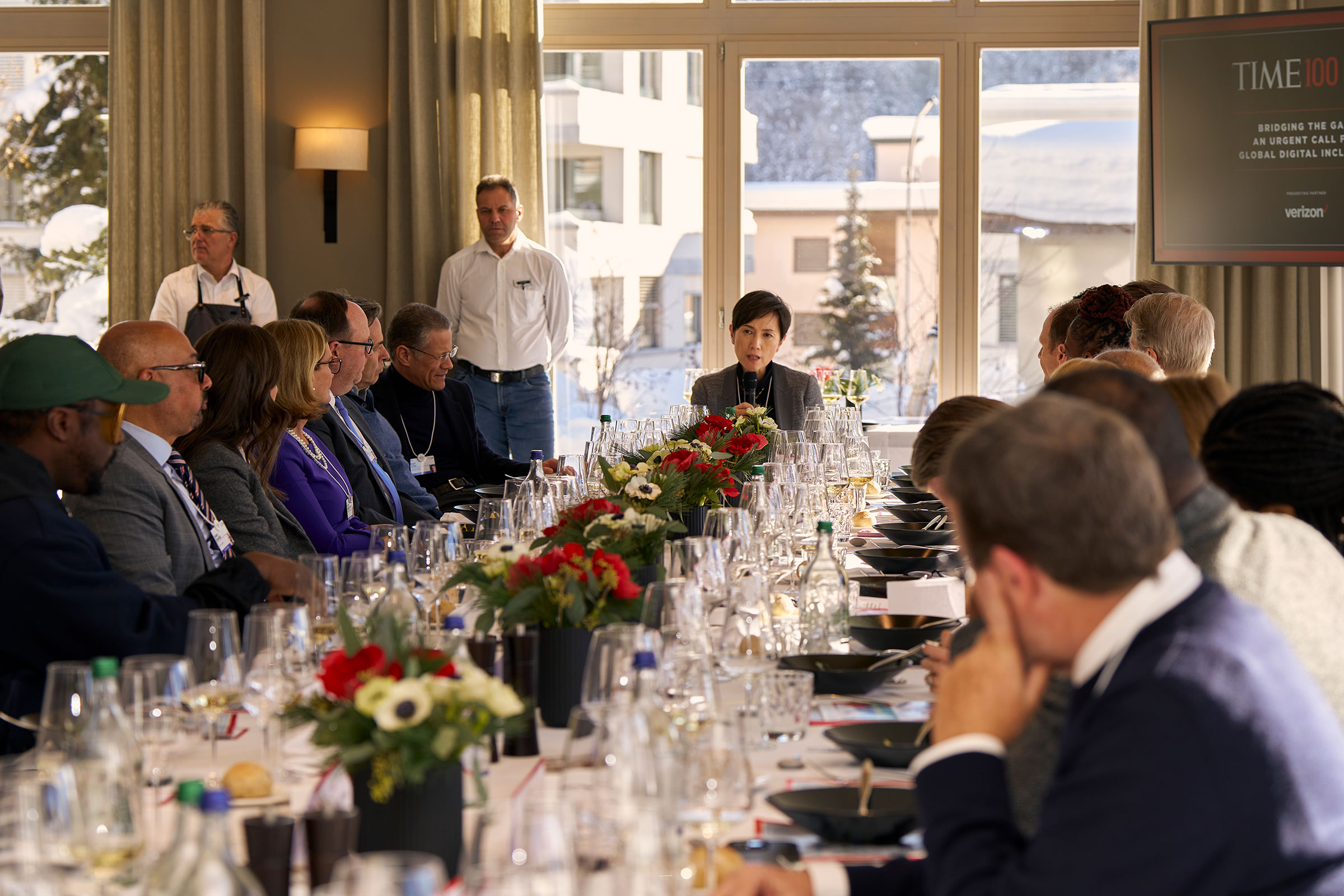Digital connectivity is widely taken for granted. Although 95% of the global population now lives in areas served by mobile broadband connectivity, billions of people still remain offline. That’s because far too many people in mostly low- and middle-income countries face barriers to access, such as affordability.
At a TIME100 Talks roundtable discussion on Tuesday on the sidelines of the 54th World Economic Forum in Davos, leaders from across finance, politics, technology, and civil society stressed the importance of bridging this gap. It is crucial not just for the sake of equality (and its potential to improve matters related to sustainability, education access, and financial inclusion), but even for global democracy.
“We need to address accessibility, affordability, and usability in the digital space,” TIME CEO Jessica Sibley told attendees at Davos’s AMERON Hotel, noting the importance of digital access in enhancing media literacy as “a backbone of democracy.” Hans Vestberg, the chairman and CEO of Verizon, which co-hosted the roundtable alongside TIME, echoed that urgency. “We cannot rest until everybody is included.”
That responsibility largely falls on governments. “The intervention from the government is critical in … providing cheap, simple, usable devices and ways to access the internet,” says Sanjiv Ahuja, the founder, chairman, and CEO of digital infrastructure firm Tillman Global Holdings. “So far, the governments are rather slow.”
On this, Josephine Teo, Singapore’s minister for communications and information, agrees. “It’s very difficult to depend only on the private sector … government certainly has to exercise its resources,” she says, noting that while Singapore’s smaller geography and relative wealth has made it “easier to wire people up,” vulnerable groups risk being left behind. “So unless the government invests resources to help everyone move along, I think the digital divide is a really real risk.”
While digital inclusion has not dominated this year’s WEF gathering in the way that other issues such as the climate crisis have, attendees warn that these issues are all interconnected. Donnel Baird, the founder and CEO of the climate technology startup BlocPower, told attendees that the clean energy hardware that his firm installs in buildings and cities across the U.S. cannot operate without an internet connection, which is not a given in many low-income communities around the world. “They all report data to the cloud,” he says of the technology. “In order to run our business and install clean energy equipment, we had to learn how to close the digital divide using everything from Verizon hotspots to … community-owned rooftop mesh networks.”
Read More: ‘We Need Not Just Talking. We Need Action’: The Biggest Moments From the TIME100 Dinner in Davos
Digital access, or the lack thereof, also has huge implications for job creation, access to health and education, and even financial inclusion. “If a person is stuck in a cash economy, they cannot have a record of their financial transactions, they cannot build a credit history, they cannot climb the economic ladder,” warns Jorn Lambert, the chief digital officer at Mastercard.
But amid an unprecedented election year, in which more than half of the world’s citizens across some 65 countries will go to the polls, perhaps one of the most urgent challenges facing the world today is the threat posed by mis- and disinformation, which has been a major topic of discussion at Davos. Beyond enhancing digital inclusivity, Teo noted that the media has an important role in securing digital trust for the long-term, stressing that the risks with going online could drive people to withdraw from digital engagement “to our great detriment. The ability to build digital trust is essential.”
It’s for all of these reasons that Achim Steiner, the administrator of the United Nations Development Programme, argues that the digital divide must be treated as a major threat. “Digital exclusion is the most dangerous phenomenon alongside climate change of our time,” he says, “because if you don’t address it, you will lock countries, communities, people, societies into an abysmal prospect for inequality and exclusion.”
Other attendees at the TIME roundtable included the U.K.’s Princess Beatrice, American musician Will.i.am, and Togo’s Minister of Digital Economy and Transformation Cina Lawson.
TIME100 Talks: Bridging the Gap: An Urgent Call for Global Digital Inclusion was presented by Verizon.
- Donald Trump Is TIME's 2024 Person of the Year
- Why We Chose Trump as Person of the Year
- Is Intermittent Fasting Good or Bad for You?
- The 100 Must-Read Books of 2024
- The 20 Best Christmas TV Episodes
- Column: If Optimism Feels Ridiculous Now, Try Hope
- The Future of Climate Action Is Trade Policy
- Merle Bombardieri Is Helping People Make the Baby Decision
